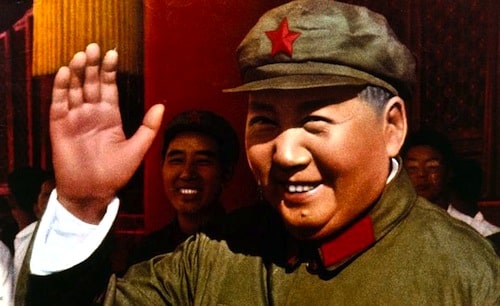
My father, a New York financier, used to call dubious stocks or bonds, “Chinese paper.” Last week, we saw a blizzard of Chinese paper, both in China and around the world.
As manager of a sizeable investment portfolio (an unwelcome second job from my main work, journalism), I watched last week’s near death experience on world markets with a mixture of cynicism and alarm. First of all, remember when Americans – and particularly Republicans – demonized Mao’s China and endlessly warned about the perils of Communism?
Well, the Chinese seemed to have listened. China ditched Communism and embraced runaway capitalism – or at least a hybrid of 1900 raw capitalism and state socialism. But Chairman Mao was proven right. He warned his people against the evils of “casino capitalism” and money lending.
The near collapse of China’s stock market in recent weeks scared the hell out of the entire world but, at least so far, really has not mattered very much. China’s markets are insulated from the rest of the world. They serve as a way of letting average people share some of China’s growth and as a form of national lottery – call it Beijing bingo.
Western stock markets are also semi-rigged casino games in which the big boys and their ultra high speed computer systems almost always win at the expense of small fry.
Speculating on the New York or London markets is akin to what Samuel Johnson’s famous quip about lotteries: “a tax on fools.” But compared to China’s crazy markets, New York and London look like Presbyterian church raffles. Chinese are a nation of frantic gamblers.
What is truly of concern about China is the dangers of implosion of its banking sector and the slowing of economic growth. China has been steaming along at 10% growth per annum; now it’s down to a mere 7%, a rate western nations can only dream of achieving. If China could but sustain 7%, that would be dandy. But it likely will not. China’s raw material import boom is finished. So watch out Canada, Australia, Brazil, Peru, and Africa.
In fact, I have long wondered about China’s economic reporting. Based on my 16 years of doing business in China, I don’t trust Beijing’s happy-face economic statistics or its banks.
China is the Wild East. Its business rules are mostly made up on the fly. I first went to China in 1975. The Great Cultural Revolution was still raging. Mao was gravely ill. His Gorgon of a wife, Jiang Qing – known to Chinese as “the White Boned Devil”) was leading the notorious Gang of Four trying to stamp out Marxist-lite counter-revolutionaries. China was in chaos. But at least it had no stock market problems.
Ever since Deng Xiaoping took command of China and decreed “it does not matter what color cats are as long as they catch mice,” China has vented its long-restrained commercial powers. The incredible growth of China’s economy since 1991 is unprecedented in history, a true “stupor mundi.”
Of course, this growth came from near zero. When I first started going to China everyone wore threadbare Mao suits and subsisted in profound poverty. Today, China is said to be the world’s second largest economy.
South Korea performed an equally amazing rise from rags to riches. Both nations hugely benefitted from being granted access to the mighty US market.
I’ve always wondered where did all the money come from? A sea of credit was created by the Party’s banking system. As a result, China embarked on the biggest building programs in history. I recall in the lovely northern city of Dalian watching workers go round the clock putting up apartment buildings with marble floors and halls.
Finance came from state and local banks – thank you Communist Party. Or from thin air.
China’s orgy of buildings, airports, new cities, harbors, highways, high-speed trains was all financed by “Chinese paper” and overseas Chinese money. Today, no one knows how much bad debt is choking China. My sense is that one of these days the whole credit house of cards may come crashing down, igniting another worldwide panic. I instructed my money mangers to stay out of Chinese investments three years ago.
Asian stocks dependent on exporting to China are in big trouble. America’s near death experience in 2008 was the result of far too much credit which had become a sort of amphetamine drug for the economy.
The financial witch doctors at the Federal Reserve in Washington artificially inflated the equity market by so-called monetary easing (aka printing money). Savers were punished, lenders rewarded.
Last week, many stocks inflated by the Federal Reserve came crashing down as all the hot air that had pumped them up rushed out of the market.
The same holds true for China.
China needs another generation to master the difficult juggling act of capitalism. But Chinese, who are by nature brilliant businessmen, will learn. Right now, however, they should take a breather and straighten out the big financial mess at home.
China is not about collapse. As the French say, “take a step backwards to better leap in advance.”
The US seems poised for growth – if its useless Federal Reserve central bank will just get out of the way. Interest rates must come up to restore market stability. We can’t blame all our problems on China. Rather, on our own Great Wall of Chinese Paper.
Reprinted with permission from EricMargolis.com.


